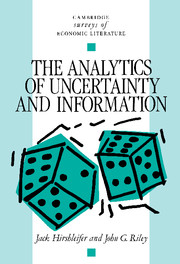Book contents
- Frontmatter
- Contents
- Acknowledgments
- Introduction: The economics of uncertainty and information
- Part I
- Part II
- 5 Information and informational decisions
- 6 The economics of emergent public information
- 7 Research and invention
- 8 Informational asymmetry and contract design
- 9 Strategic uncertainty and equilibrium concepts
- 10 The economics of contests
- 11 Competition and hidden knowledge
- 12 Long-run relationships and the credibility of threats and promises
- Index
10 - The economics of contests
Published online by Cambridge University Press: 05 June 2012
- Frontmatter
- Contents
- Acknowledgments
- Introduction: The economics of uncertainty and information
- Part I
- Part II
- 5 Information and informational decisions
- 6 The economics of emergent public information
- 7 Research and invention
- 8 Informational asymmetry and contract design
- 9 Strategic uncertainty and equilibrium concepts
- 10 The economics of contests
- 11 Competition and hidden knowledge
- 12 Long-run relationships and the credibility of threats and promises
- Index
Summary
In this chapter we consider a class of social struggles commonly referred to as contests. A contest, for our purposes, is a rivalrous situation in which a single prize, or a small number of prizes, are awarded to the “high bidders” – the contestants willing to sacrifice the most in terms of some specified input variable. (A special rule is necessary if ties are possible; in that event, it will always be assumed here, the winner is selected at random from the tying high bidders.) Among such contests are auctions, whether conducted by means of sealed or open bidding. Other examples include athletic races, election campaigns, and wars – each of which represents a kind of competition where prizes are won by the high bidders in terms of resource commitment.
What distinguishes a contest from other forms of economic competition is that reward is in no way proportionate to the quantitative resource commitment – total, average, or marginal. Rather, winning or losing depends solely on how one's commitment ranks in the distribution of such offerings. In general a contest may have multiple prizes, not necessarily all equal in value. But, unless otherwise indicated, single-prize contests will be assumed here.
- Type
- Chapter
- Information
- The Analytics of Uncertainty and Information , pp. 369 - 404Publisher: Cambridge University PressPrint publication year: 1992
- 4
- Cited by



